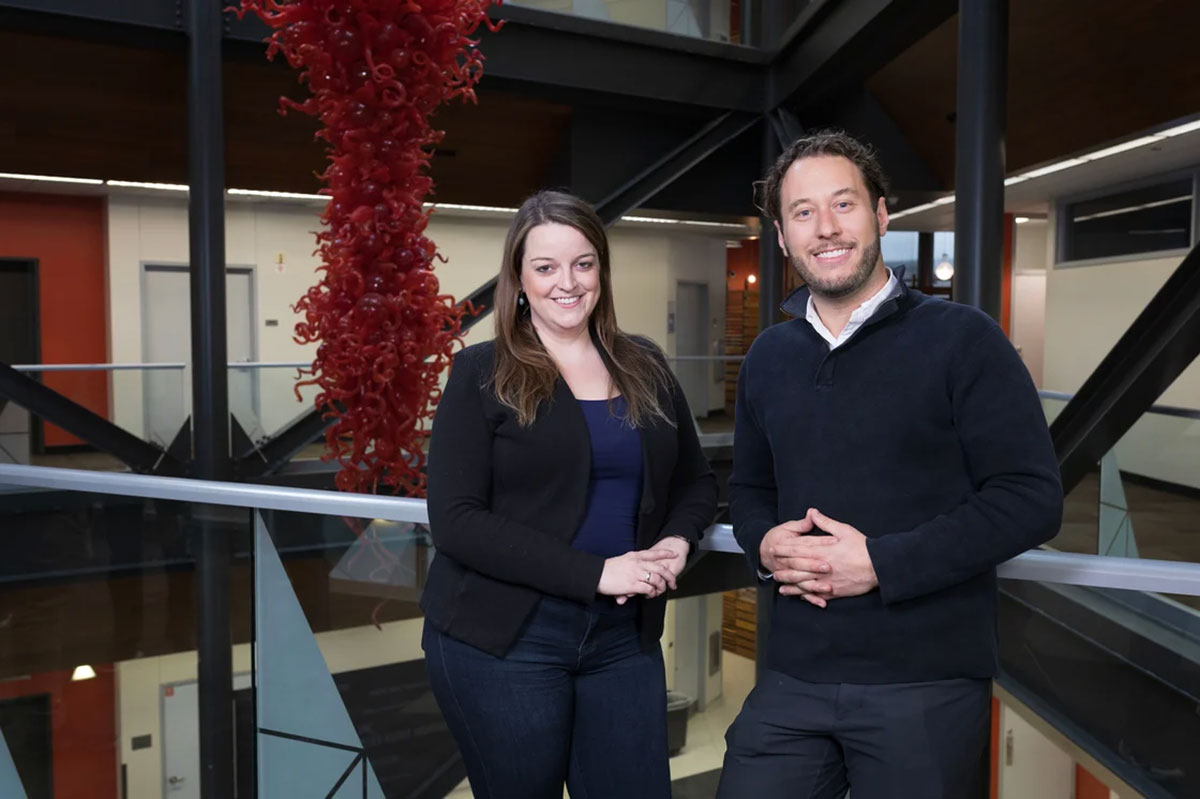NCITE Secures First-Ever Patent for Chatbot Technology
After years of research and design, an NCITE research team has successfully secured a patent for chatbot technology designed to streamline suspicious activity reporting forms.
- published: 2024/09/18
- contact: Sam Peshek - UNO Office of Strategic Marketing and Communications
- phone: 402.554.6423
- email: ncite@unomaha.edu
- search keywords:
- patent
- chatbot
- suspicious activity reporting
- SAR

Highlights
- The patent marks a significant achievement for NCITE, signaling the center’s capacity for tech innovation and delivering solutions to market.
- Unlike traditional reporting methods, such as phone calls or online forms, which can feel impersonal or overly complex, NCITE’s chatbot offers a streamlined, conversational experience.
- NCITE’s Erin Kearns, Ph.D.: “This chatbot fills a critical gap, providing a safe and user-friendly way to report concerns that might otherwise go unnoticed. It empowers individuals to take action without fear of judgment or making mistakes.”
The National Counterterrorism Innovation, Technology, and Education (NCITE) Center at the University of Nebraska at Omaha (UNO) has achieved a historic milestone, securing its first-ever patent for an innovative chatbot technology.
Designed by a team of NCITE researchers led by Joel Elson, Ph.D., and Erin Kearns, Ph.D., this innovative tool is set to transform how individuals report suspicious activity, providing law enforcement with more accurate, actionable information to safeguard communities.
The patent marks a significant achievement for NCITE, signaling the center’s capacity for tech innovation in the homeland security space. The newly patented chatbot technology is available for licensing and aims to modernize threat reporting, making it more accessible and efficient.
“NCITE is incredibly proud to receive its first patent, a testament to our commitment to turning research into real-world solutions,” NCITE Director Gina Ligon, Ph.D., said. “This chatbot exemplifies the cutting-edge work our interdisciplinary team is doing, merging innovation in IT, criminology, and psychology to address urgent national security challenges.”
A Modern Approach to Threat Reporting
Unlike traditional reporting methods, such as phone calls or online forms, which can feel impersonal or overly complex, NCITE’s chatbot offers a streamlined, conversational experience. Users can report suspicious behavior anonymously or by name, and the tool responds in real time to ensure critical details are captured without overwhelming the user.
“We designed this tool to make reporting easier and less intimidating for people,” Elson said. “By simulating a conversation instead of following a rigid form, the chatbot encourages users to share more detailed and relevant information.”
Years of Research, Collaboration, and Innovation
The chatbot’s journey from concept to patent approval began in 2021 when Elson and Kearns received a grant from the Department of Homeland Security’s (DHS) Center for Prevention Programs and Partnerships. Their research focused on overcoming the barriers that prevent people from reporting suspicious activities, a problem that often leaves threats unaddressed.
NCITE filed a patent for its chatbot technology in October 2023 through UNeMed, the commercialization office for the University of Nebraska Medical Center (UNMC) and UNO. Graduate and undergraduate students from UNO’s College of Information Science & Technology made significant contributions to the system and are listed as co-inventors on the patent.
"NCITE showcases the power of interdisciplinary collaboration, giving students a unique opportunity to work on and implement solutions to real-world problems," said Elson. "Few places in the country involve students at this level, where they can earn patents before even completing their degree."
“This chatbot fills a critical gap, providing a safe and user-friendly way to report concerns that might otherwise go unnoticed,” Kearns said. “It empowers individuals to take action without fear of judgment or making mistakes.”
In addition to securing its first patent, NCITE partnered with FedTech’s Homeland Security Startup Studio to explore commercialization opportunities. The partnership helps bring NCITE’s technology to market by connecting it with entrepreneurs who can guide the development of a business plan.
“We are excited to move forward with this first patent, and we have high hopes for its impact in both public safety and beyond,” said Tin Nguyen, Ph.D., NCITE’s senior research associate and technology transition lead. “This achievement opens doors for us to bring more innovations to market in the future.”
Tyler Scherr, Ph.D., a licensing associate with UNeMed, said the patent award speaks to the exceptional level of quality and novelty for the work being done by the NCITE team.
“From a commercialization perspective, it makes the technology much more enticing to license,” Scherr said. “A patent provides a licensee with a "moat" to fend off competing products that may enter the market.”
Looking to the Future
NCITE is actively exploring licensing options for the chatbot across both public and private sectors. The technology’s potential applications range from law enforcement to corporate and educational settings, addressing issues from suspicious activity reporting to workplace conduct complaints.
“Our vision for the chatbot is broad,” said Nguyen. “We’re particularly focused on integrating it into Nebraska law enforcement and educational systems, but we also see significant potential for this technology in a variety of industries. This is just the beginning.”
This first patent represents a pivotal moment in NCITE’s long-term strategy to develop innovative tools that serve the public good, ensuring its work continues well beyond its initial 10-year cooperative agreement with DHS.